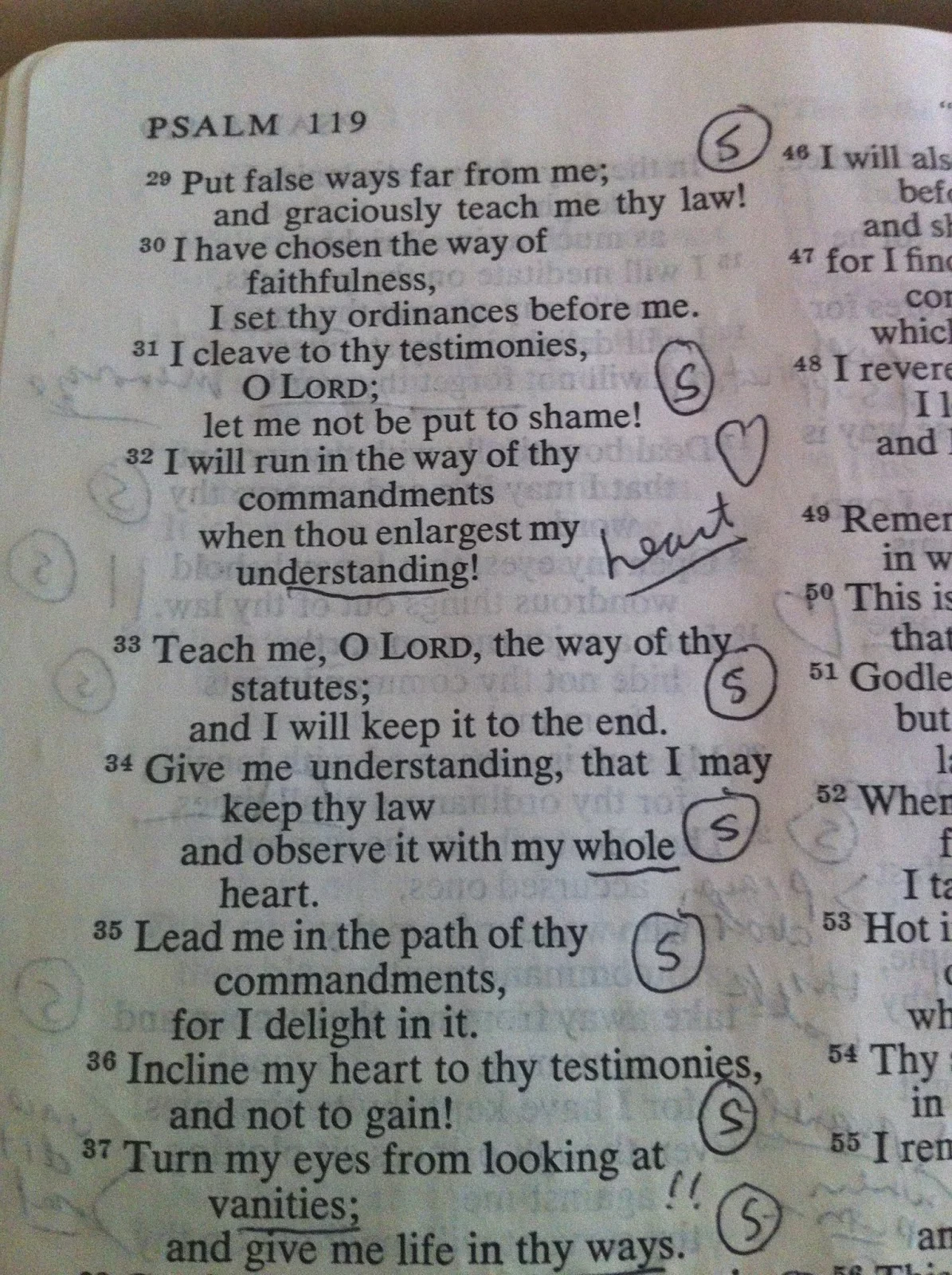by Blake Purcell, SRS Field Director
My family makes fun of me because in the summer I love to get out and do "slash and burn" trimming of our own land (or anyone's that needs it). Summertime is a good time to get out and deal with the land God has given us. (I am in the middle of just such a project now at my son-in-law's and 4 grand babies' house.)
And of course, we are God's field (I Corinthians 3:9), so God perhaps loves to dig us up and clean out our hearts in the summertime as well.
In my very slow personal Bible reading plan I am going through the Psalms, and yesterday came to the behemoth, Psalm 119, with its 176 verses. I have studied this Psalm in the Navigator way starting in probably 1984, and it fits the hand illustration like a glove (Has verses that imply or are explicit about meditating, memorizing, hearing, reading and studying the Word.)
But in this study yesterday and today what struck me as the dominant feature of this mountain of a Psalm are David's supplications and prayers to God, 57 separate verses, with about 67 particular requests.
The astounding thing is that most of them are not about some external problem in the kingdom, or with his kids, or his ministry, but are about David's relationship to the written word of God. He makes 60 requests that God would improve his relationship with the Bible! Incredible.
So today I took the time to pray out loud, but quietly, on the back porch of our apartment, every one of them. I suppose one of the most penetrating one for me was verse 29,
Put false ways far from me; and graciously teach me Thy law!
We cannot really grow in the Word if we have false motives for doing it. We can study the Word for reasons other than growing in Christ-likeness. The first step in my life to doing that is believing that I can't do that, believing that I am beyond false motives.
This reminds me of 2 passages I read recently in Paul. In I Thessalonians 2:4-6, he asserts that his ministry of the Word did not spring from guile, and therefore they did not use flattery or use the ministry to get rich, and to get glory from men. He knew He was dealing with a God who was constantly testing His heart.
And that's what David is fleshing out in Psalm 119. He is saying, "God, apart from you I cannot know my own wicked heart, I cannot know my own false ways, and I cannot grow in your Word in a way that is not self-serving." That is why David says God must graciously teach Him his law, because David cannot do it without God's grace.
And therefore David gets serious about the very roots of His relationship with God, and asks God to dig around them and put only the soil of sincerity for them to grow in.
Along the same lines we see verse 125,
Give me understanding that I may know thy testimonies.
David knows that he cannot even study the Bible meaningfully and sincerely unless God intervenes and gives Him the grace to do it.
David prays at least 40 of these kind of prayers in this Psalm.
A Good Root Leads to Good Fruit
In the SRS seminary we have a theme verse: Ezra 7:9b, 10, ...for the good hand of his God was upon him. For Ezra set his heart to study the law of the Lord, and to do it, and to teach His statues and ordinances in Israel.
In Ezra 7:9 and 10 we see that Ezra had 3 spheres of his life. He set his heart to study, to seek the Law of the Lord, which was his personal relationship with God through the Word. To do the law of the Lord, we identify as His character, and to teach it we identify as His public ministry. Public ministry therefore is an overflow of one's intimacy with Christ and his application of that intimacy in his own life.
In our seminary we compare these 3 spheres of life to the root (personal relationship with God), trunk (character) and branches (public ministry) of a tree. (I think I got this illustration from Rev. John Mahon when we were both with the Navigators.)
Therefore, since I know of no place in the Bible in which a man of God prays so many ways about His character or his ministry (Christ in John 17 comes close here), we can safely say that the biggest challenge in our lives will always be to simply have a right relationship with God through His Word. The soil and the roots will always be the root issue.
If we have a problem in our character, it is because of our roots. In our family, it is because of our roots. In our ministry, it is because we have a root problem. Dealing with our roots deals with the source, not the symptoms, of our spiritual diseases.
So I challenge you today or tomorrow to read Psalm 119, mark and count David's supplications (I did it with an S and a circle around it as you can see in the photo above). And then pray them each out loud to God, and share with us which ones stood out the most to you and which ones you feel need to be most applied to your heart. You can give us your answers on the comment section of this blog.
I look forward to hearing from you!
May God enlarge our hearts this summer (by slashing and burning the weeds and bramble that have grown there) so that we may run in His commandments! (vs. 32)

